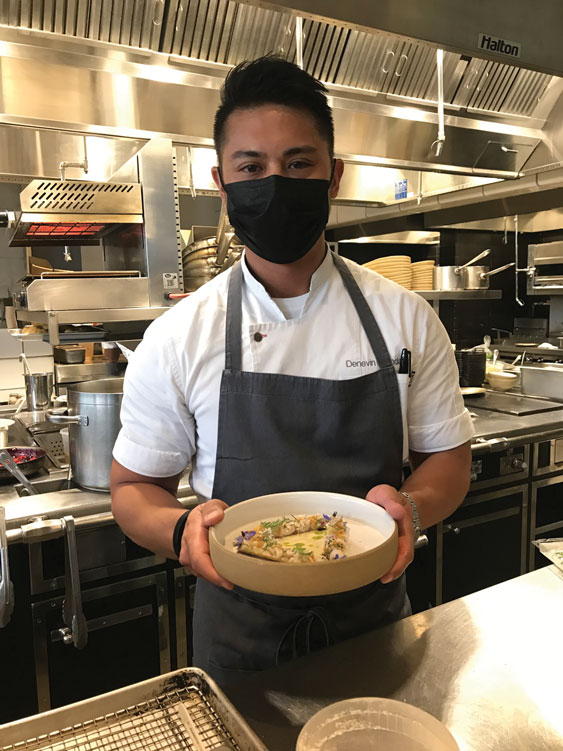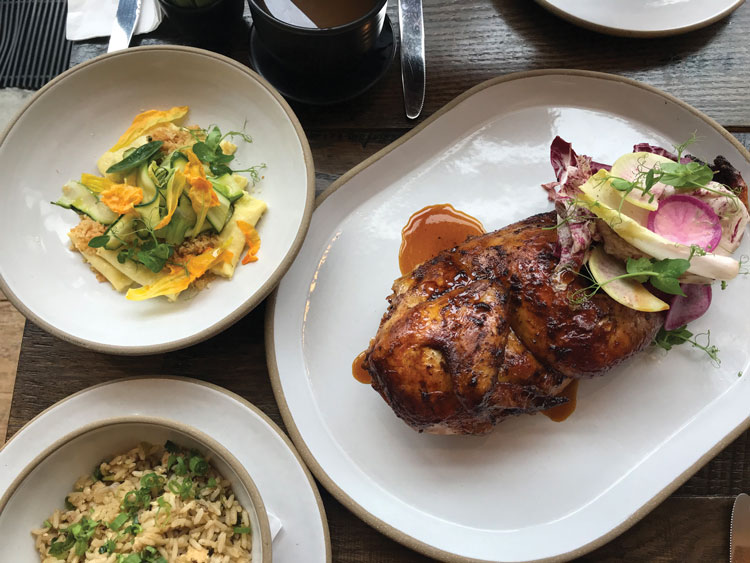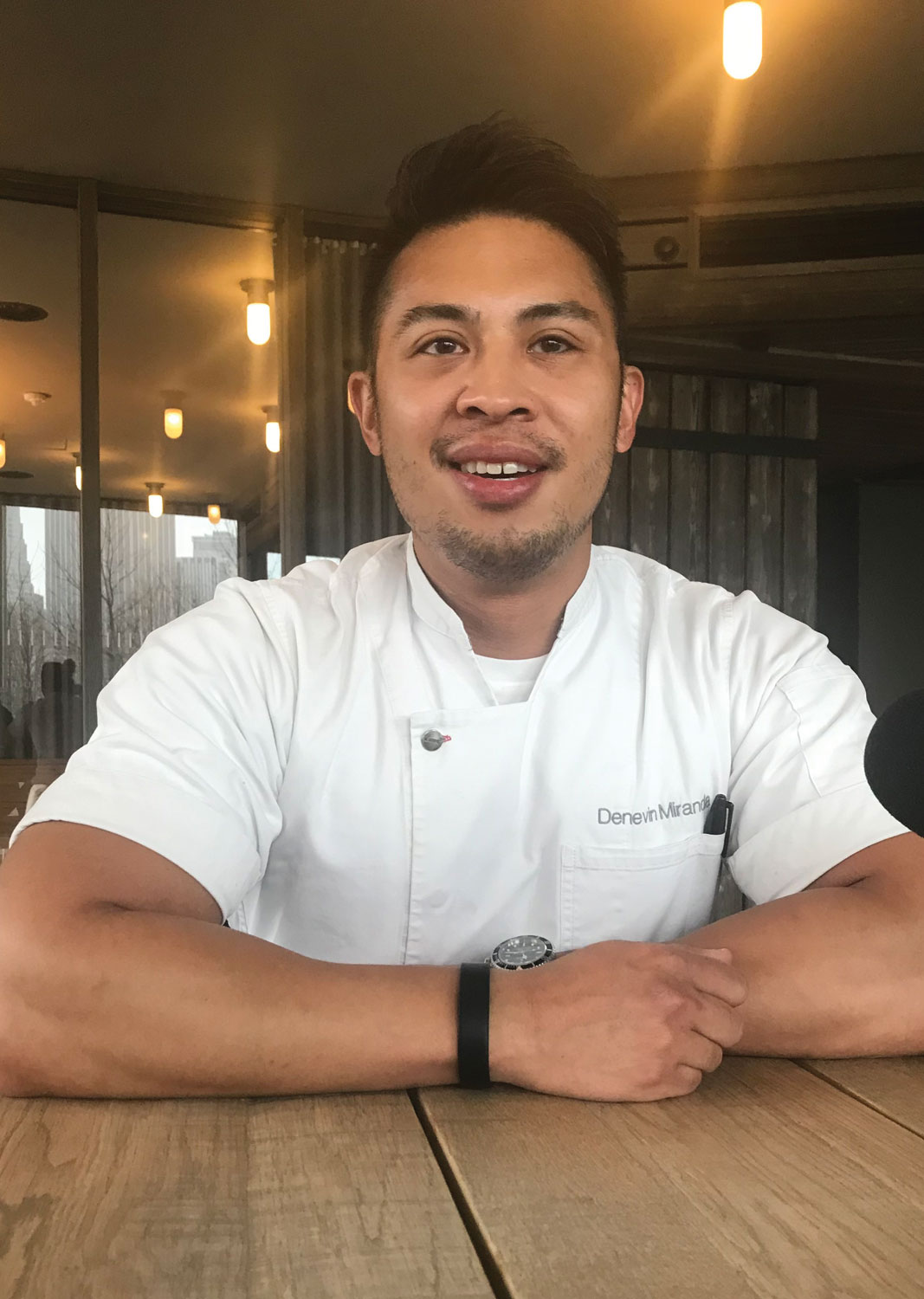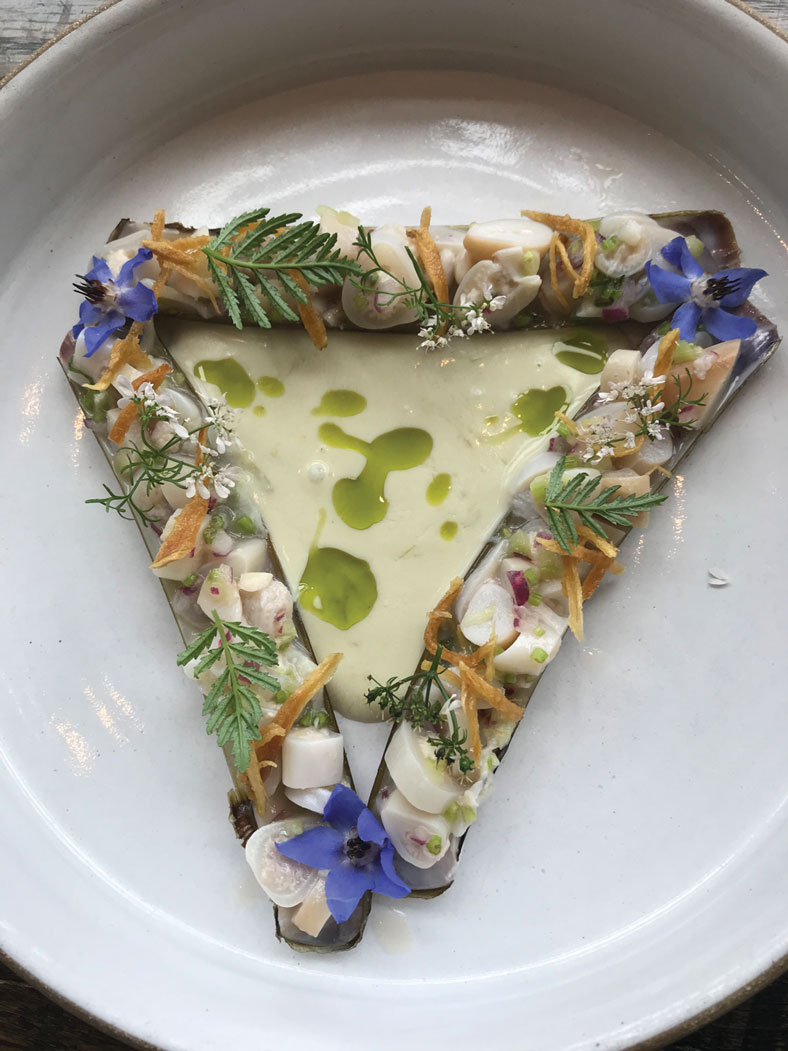
MEET the new Filipino American chef creating waves in the culinary industry.
His name is Denevin Miranda and his latest claim to fame? He was recently declared as the champion of the Food Network show “Chopped” with its new season focused on “Meat Fight,” a glorious, carnivorous throwdown for gastronomy lovers.
The new episodes focus on pork, beef, goat and bison and for Denevin’s episode, pork was the protein of choice. The show — which described Denevin, a Chef de Cuisine at 1 Hotel Brooklyn Bridge in New York City as a “classically French-trained with a lot of his flavors rooted in Filipino-style cuisine” — was an epic meat fight among the four chefs highlighting their arsenal of ideas for their dishes.
There are three rounds and one chef is cut, well, “chopped” from the competition in every round. They are each given a mystery box of ingredients that they have to use and highlight in the dishes they create.
For the appetizer round, the chefs had these in their box: pork butt, barbecued spare ribs, Brussels sprouts, and Calvados brandy, and they had 20 minutes to prepare a dish.
“I was looking at all these ingredients and I said, ‘Yeah, I can sisig this,’” Denevin told the Asian Journal in an interview.
Sisig is a nod to his Filipino heritage which he wanted to highlight. He served the crisped-up pork butt and spare ribs along with Brussels sprouts and apple salad on the side to complement the unctuousness of the sisig.
The dish ended up winning the judges’ praises and called it the best dish in the competition.

Pro football player turned Food Network star Eddie Jackson described Denevin’s sisig as “remarkable” while chef and restaurateur Chris Santos said it was an “absolutely dynamite, a really great dish.”
Their fellow judge, executive chef Amanda Freitag, praised Denevin for his efforts in keeping the pork as the star of what she referred to as a perfectly seasoned dish. “Denevin really introduced himself as a very buttoned-up chef who knew how to put flavors together,” Freitag added.
After three grueling rounds, Denevin was the last man standing and was declared the champ, winning a $10,000 grand prize as he dedicated his win to his dad.
Denevin was confident from the get-go, as he went into the competition with a goal to win it and if he could, promote Filipino cuisine as well. He also said he wanted to make his parents proud, especially his father who has passed away.
“I knew going in there that I wanted to do something Filipino and show something to the judges. And sisig is one of my favorite dishes,” he said. “Actually, my grandma never cooked it. I was introduced to that when I went to the Philippines. And you know, it’s a dramatic dish, because it comes out sizzling. Yeah, and it’s like, you know, it’s like you can’t stop eating.”
For sisig fans who want to try his winning dish, you’d have to wait.
“There’s something I’m actually working on translating that dish to one of the dishes on my menu,” he shared. “It’s not ready yet. We just opened like, two weeks ago so I definitely want to get everything established.”
He’s looking forward to including the dishes he made on the show in The Osprey’s chef’s tasting menu.

A tribute to his family
We met with Denevin in his work at 1 Hotel Brooklyn Bridge one rainy Sunday morning and had a freewheeling chat about his win, dreams and aspirations, and growing up as a gay Filipino American.
Denevin was born and raised in New York. His dad Fernando was from Manila and his mom Lilibeth from Tarlac. It has been a while since he visited the Philippines but as he told host Ted Allen on the show, he wanted to use his prize money to bring his husband Alex to the country.
“My family was very rooted in our culture,” he shared. “I was raised in a very Catholic way and my grandmother actually lived with us, she practically raised us.”
The Mirandas moved to Long Island because his parents felt it was a better environment for Denevin and his brother to grow up in. He fondly remembers his lola Liberata had a garden in the backyard where she planted all these Asian vegetables.
In hindsight, it was his first experience in farm-to-table dining as his lola would just pick the vegetables she needed for whatever dish she was cooking at that time.
At The Osprey, a locally-sourced farm-to-table restaurant serving New American cuisine, he is inspired by this memory and he and his team are always looking for the best local produce so they go to the local green markets and try to build relationships with the farmers.
“That really brings me back to like you know, going out in our backyard with my lola picking vegetables, some of the tomatoes that she was growing were so sweet. And I still have that memory kind of in my head, you know? And she’d make beautiful dishes with that, like sinigang. And it’s like, you can’t replicate it,” he shared.
He remembers his lola loved to cook and entertain and on Sundays, there would be families coming together in their home after church, enjoying delicious home-cooked Filipino food.
One distinct memory he has is that of his lola not cutting corners. If she wanted coconut milk, she would go the traditional way and grate and squeeze the coconut herself.
But more than the culinary skills of his lola, it was her strength, resiliency and fortitude that continue to amaze Denevin to this day.
Denevin was in high school when he realized he wanted to be in the culinary industry. He said he was asthmatic growing up so he wasn’t as athletic as he is now. He ended up gravitating towards cooking through his home economics classes and he realized how much he was enjoying it.

His parents told him a story that when he was a toddler, he wouldn’t play with the toys they bought for him but he would crawl over to the kitchen and play with the pots and pans. He remembers sitting on a stool watching his lola prepare their meals from scratch observing her intently as she sliced and diced the ingredients. He would gaze in awe as his lola cooked the meals with love and respect for quality and tradition.
These memories helped him to define the kind of chef that he is today.
“I love to kind of bring that same kind of feeling back with my food like how my grandma and seeing people eat her food, you know, especially like people that she’d bring out from the community that weren’t Filipino,” he said, referring to the neighbors including priests that would get together in their home.
Journey to ‘Chopped’
Some of Denevin’s friends and colleagues have encouraged him to join these reality-based cooking shows on the Food Network or Bravo. He said he applied to be part of Top Chef before, went through the interview process but had conflict in the scheduling process since he had just accepted a new job in Miami and couldn’t afford to take a couple of months off.
Denevin went to school at the Johnson & Wales University in Miami where he received his degree in culinary arts and decided to stay in the city for a few years. There, he honed his craft working at Setai in Miami Beach, SLS and Mandarin Oriental, cultivating his mastery of classical as well as modernist cooking techniques.
He returned to his birth city of New York because it is such an established culinary destination. “And I wanted to create a name for myself here,” he quipped.
While working at The Osprey one day, he received a call from a casting agency working with the Food Network for Chopped asking him if he’d consider being part of the show.
This was around March 2020 and due to COVID-19, it was postponed and pushed back much further.
The production reached out around September to ask if he was still up for it and that they have resumed shooting episodes in Tennessee. They shot the episode around October and it was aired in mid-March.
Denevin said it was a great experience and that he would do it again in a heartbeat, so he could showcase his Filipino heritage and use the platform to promote Filipino cuisine and its flavors.
On the plane en route to Nashville, Denevin thought about the relationship he had with his father Fernando and how he came out to him. His dad succumbed to cancer 11 years ago.
He was both nervous and anxious and his emotions were all bottled up inside. Then he felt a sudden calm and felt his father’s presence and he knew he wanted to tell their story.
“You know, (as a) Filipino American, you see the struggle that your parents felt to come to this country, and to build a life for you here, you don’t want to disappoint. And that was my biggest fear was to be a disappointment,” he shared.
He mustered enough courage and told his father what he was and that the friend he introduced to his parents a few years earlier in Miami was actually his boyfriend (now husband).
“And basically, he was kind of like, ‘I knew that.’ That’s one thing, but when he, you know, what he really wanted to tell me was, ‘That’s not important, I want you to be happy’,” he added.
What Denevin got was more than just acceptance from a father.
“He gave me amazing courage, and he pretty much broke down my insecurities. You know, to be myself, and he encouraged me to do that. And I’m glad that I was able to share my story,” he said.
Denevin looked up to the show’s host Ted Allen and while in the show’s shoot, he was grabbed the serendipitous opportunity to thank him for inspiring a young kid to be his true self.
When he was growing up, he considered Allen as an inspiration and he remembers sitting in the living room with his family watching and enjoying Queer Eye for the Straight Guy. It was a special moment and he is happy that the show was able to incorporate parts of that conversation as he came full circle of sorts.
Filipino flavors
On The Osprey’s current menu is a razor clam appetizer dish, his homage to the Filipino kinilaw. Denevin’s creativity and artistry are in full display in this beautiful and delicious dish.
On the first few days they offered the dish, he went to the diners who ordered it and asked for feedback. He said the response to the dish was great and they asked him for the inspiration behind it.
“I told them it’s actually inspired by a Filipino dish. All the flavors are there. It’s citrus, coconut and I use fish sauce. I love fish sauce, it’s like my favorite,” he said. Even the main look of the dish is inspired by the triangle on the Philippine flag.
The Osprey serves contemporary American cuisine, inspired by the cultural melting pot and global diversity of New York City’s neighborhoods.
From his perspective as a Filipino-American chef, it could be dishes that are inspired by his roots, as well as dishes based on experiences he had having Jamaican food in Brooklyn, or maybe even a combination of both, using techniques he has learned throughout his career. (He shared that the Rotisserie Half Chicken uses a Caribbean jerk chicken marinade similar to the flavors of adobo.)
He is also working with their corporate mixologists on a cocktail drink that incorporates ube, which he also describes as an adult version of halo-halo. For the summer, there are plans for an outdoor Filipino-inspired New England-style seafood boil inspired by the kamayan or what some people call “boodle fight.”
These are just a couple of the many food experiences that he plans to implement in the hotel’s restaurants and bars and he is thankful that the management has given him this opportunity to cultivate this great culture.
“I’m pragmatic and I’m mostly optimistic,” Denevin said, describing the current situation of the food and beverage industry and where he sees it going. “New York is going to find a new renaissance and as the rent has become much more affordable, it is bringing younger, innovative and creative people to the city. It’s like a reboot.”
He is excited and looking forward to an almost magical moment as the food scene goes through this transition. He wants to be that beacon of optimism and show that the players in the industry can pivot and come out stronger than ever.
Denevin also hopes to further bring Filipino food out there and his optimism extends to a possible collaboration with fellow Fil-Am chefs in the city to get the job done and demonstrate the hospitality connection they have.








